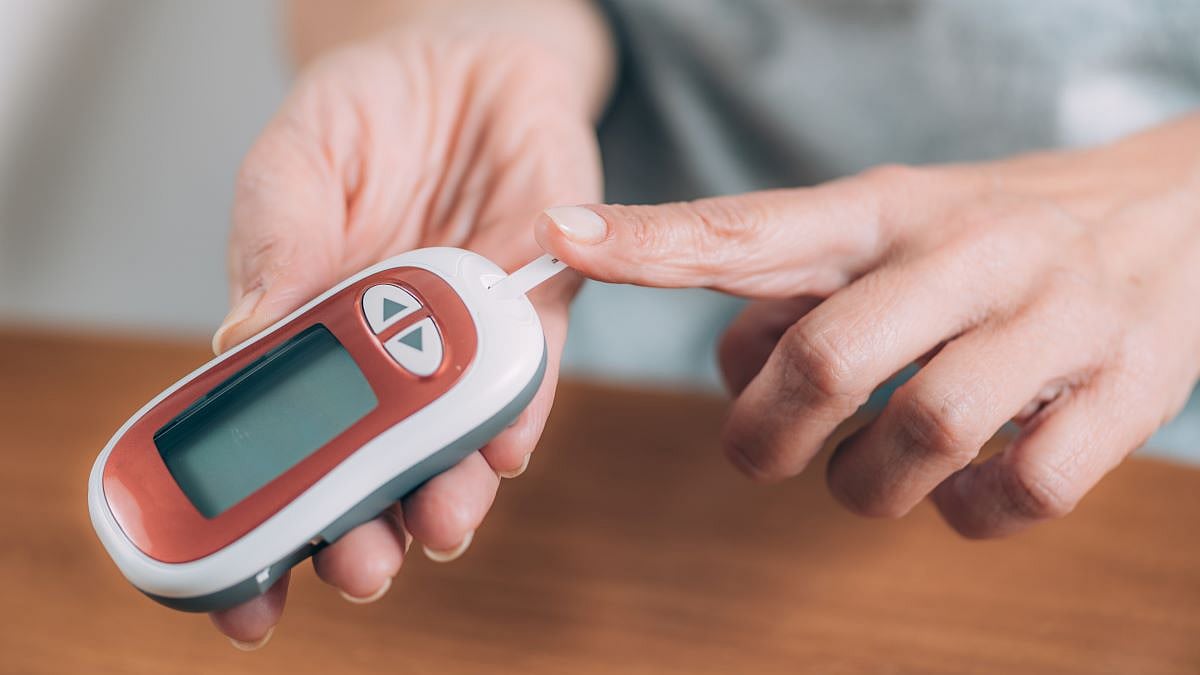Patient Resources
Get Healthy!
Results for search "Obesity".
Health Videos - 19
Intermittent Fasting Falls Short for Weight Loss, Major Review Finds
A large, new evidence review finds intermittent fasting may not help overweight or obese patients loose a significant amount of weight or improve their quality of life.
From Kitchen to Clinic: How Culinary Medicine Is Changing Health Care
HealthDay takes you on a tour of the Yale Teaching Kitchen, where patients with diabetes, heart disease, obesity and more learn to cook for life.
GLP-1 Weight-Loss Drugs Are Changing What Americans Buy to Eat
A new study finds when people start taking GLP-1 medications, spending at grocery stores and restaurants changes.
GLP-1 Medications May Ease CPAP Dependence in Sleep Apnea
A new study suggests GLP-1 medications may reduce the need for CPAP machines in people with obesity, diabetes and sleep apnea.
Do GLP-1 Drugs Affect Cancer Risk? New Study Says Probably Not
A review of 48 clinical trials on GLP-1 safety suggests the popular meds probably have little to no effect on cancer risk.
90% of Americans at Risk for Newly Defined Health Condition Called CMK Syndrome
CMK syndrome links heart, kidney and metabolic risk factors and the American Heart Association says it’s extremely common in U.S. adults.
Study Links Global Rise in Cancer to Obesity Across All Age Groups
Researchers analyzed cancer trends in 42 countries and found a surge in certain cancer types in both young and older adults – with one exception.
Gen X and Baby Boomers Addicted to Ultra-Processed Foods, Study Finds
1 in 5 women and 1 in 10 men from Generation X and the tail end of the Baby Boom meet the criteria for addiction to ultra-processed foods, researchers say.
Could Ditching Daylight Saving Time Improve America’s Health?
Researchers compare three hotly debated time policies and find a surprising winner when it comes to improving health outcomes for millions of people.
Metabolic Syndrome Linked to Increased Risk of Parkinson’s Disease
In a new study, people with metabolic syndrome were 40% more likely to be diagnosed with Parkinson’s disease. Metabolic Syndrome is a cluster of conditions that increase the risk of heart disease, stroke and type 2 diabetes.
Does Losing Weight Before IVF Improve Chances For Pregnancy?
A new study finds women with obesity who lose weight before IVF have increased odds of getting pregnant, especially through natural conception.
Weight Returns Within Months Of Stopping Anti-Obesity Drugs, Study Finds
People who quit taking anti-obesity meds, including popular GLP-1 receptor agonists, may regain a significant amount of weight after eight weeks, a new study finds.
Obesity-Related Cancer Deaths Tripled Over the Past Two Decades, Study Finds
Researchers discover steep increases in cancer deaths linked to obesity since 1999, especially among women, older adults and Black people.
How Does BMI Affect Breast Cancer Risk in Postmenopausal Women?
A new study finds the combination of excess weight and heart disease in postmenopausal women is associated with an especially high risk of developing breast cancer.
GLP-1 Weight Loss Drugs May Lower the Risk for 14 Obesity-Related Cancers
A new study finds women taking GLP-1 Receptor agonists were significantly less likely to develop obesity-related cancers.
Calorie Restriction May Lead to Small Improvements in Depression, Study Finds
A new study finds restricting calories or eating low-fat may slightly reduce depressive symptoms, but researchers say the evidence is limited.
Popular Weight Loss Drugs Do Not Increase the Risk of Depression, Anxiety or Suicidal Ideation, Study Finds
In a new study, researchers found no association between treatment with GLP-1 Receptor Agonists like Ozempic and Wegovy and increased risk of adverse psychiatric events.
Ultra-Processed Foods Linked to Premature, Preventable Deaths
A new study finds the more ultra-processed foods you eat, the higher your risk of dying prematurely from all causes.
Unhealthy Diet and Middle-Age Belly Fat Linked to Memory and Other Cognitive Problems
A new study finds diet quality and waist-to-hip ratio strongly impact brain function as you age.
Health News Results - 306
Love Sweet Iced Coffee? Thailand Wants You To Drink It With Less Sugar
- I. Edwards HealthDay Reporter
- February 16, 2026
- Full Page
Thailand is taking aim at sugary drinks as health officials warn that too much sugar is fueling rising rates of obesity and diabetes.
Earlier this week, nine major coffee chains across the S...
Obesity Linked To 1 In 4 Infectious Disease Deaths In U.S.
- Dennis Thompson HealthDay Reporter
- February 11, 2026
- Full Page
Obesity contributes to about 1 in every 4 infectious disease deaths in the United States, the most among wealthy countries, a major new study estimates.
People with obesity have a higher risk of hospitalization or death from infectious diseases ranging from
Nearly Half Of American Adults Will Be Obese By 2035, Study Warns
- Dennis Thompson HealthDay Reporter
- January 29, 2026
- Full Page
Nearly half of American adults – some 126 million people – will be obese within 10 years, a new study projects.
Adult obesity in the U.S. is projected to affect 47% of the population by 2035, researchers reported Jan. 28 in the
Obesity Directly Influences A Person's Risk Of Dementia, Study Concludes
- Dennis Thompson HealthDay Reporter
- January 26, 2026
- Full Page
Obesity and high blood pressure are directly linked to a person’s risk of dementia, a new study reports.
People’s odds of developing dementia can b...
Excess Weight Increases Risk Of Low Back Pain, Researchers Find
- Dennis Thompson HealthDay Reporter
- January 7, 2026
- Full Page
Did holiday treats add a few extra pounds to your frame?
If so, your risk for low back pain might have increased, as well, a new study says.
A person’s risk o...
Understanding Childhood Obesity: Causes, Treatments and How to Reduce Stigma
- Shagun Bindlish, MD, FACP, FOMA, DABOM, DACLM HealthDay Reporter
- December 30, 2025
- Full Page
While childhood obesity has become more common in recent years, this is a condition that is about more than just weight.
Childhood obesity reflects our modern environment of ultra-processed foods, digital devices and psychological stressors.
To address childhood ...
Obesity Could Speed Alzheimer's Progression, Study Suggests
- Dennis Thompson HealthDay Reporter
- December 2, 2025
- Full Page
Obesity might contribute to faster progression of Alzheimer’s disease, a new study says.
Some blood markers associated with Al...
Men's Beer Bellies Could Pose Special Risk to Heart
- Dennis Thompson HealthDay Reporter
- December 2, 2025
- Full Page
That beer belly a guy’s toting around could mean trouble for his heart, a new study says.
Said belly fat is linked to changes in heart structure that can contribute to heart failure, researchers reported Monday at the Radiological Society of North America’s a...
GLP-1 Weight-Loss Drug in Pill Form Shows Promise in Trial
- Ernie Mundell HealthDay Reporter
- November 25, 2025
- Full Page
New clinical trial results bode well for what could be the first GLP-1 weight loss drug taken as a pill, not by injection.
The daily pill, orforglipron, is currently under investigation by dru...
Most Americans Believe Obesity Is A Disease That Deserves Insurance Coverage, Poll Finds
- Ernie Mundell HealthDay Reporter
- November 25, 2025
- Full Page
A large majority of Americans now view obesity as a disease whose management, surgical or pharmaceutical, should be covered by insurance, according to a new poll.
The online Harris poll was conducted in October among nearly 4,200 U.S. adults. The study was supported by ...
Quitting a GLP-1 Before Pregnancy Linked to Higher Weight Gain, Complications
- Ernie Mundell HealthDay Reporter
- November 25, 2025
- Full Page
Women who stop taking a GLP-1 weight loss/diabetes medication just prior to a pregnancy appear to be at higher odds for excess weight gain and complications while pregnant, new research shows.
As the study authors pointed out, potential risks to the fetus of using a GLP-...
Your Butt's Shape Might Predict Frailty, Diabetes Risk
- Ernie Mundell HealthDay Reporter
- November 25, 2025
- Full Page
Researchers are standing behind new data on how people’s posteriors reflect changes linked to aging and diabetes.
Shrinkage or inflammation of the gluteus maximus muscles of the buttocks may reflect frailty, sitting time, fat deposition and
Want a Younger Brain? Keep the Muscle, Shed the Fat
- Ernie Mundell HealthDay Reporter
- November 25, 2025
- Full Page
Fitter bodies and muscles could keep brains young and fit, too, a new study suggests.
“Healthier bodies with more muscle mass and less hidden belly fat are more likely to have healthier, youthful brains,” said study senior author
Obesity No Barrier For Shoulder Replacement Surgery, Study Finds
- Dennis Thompson HealthDay Reporter
- November 21, 2025
- Full Page
Obesity shouldn’t be considered a barrier for a patient who needs shoulder replacement surgery, a new study argues.
In some places, doctors have been denying joint replacement surgery to people with a high body-mass index, due to concerns over their ability to reco...
Trump Administration Expands Visa Denials to Include Common Chronic Illnesses
- I. Edwards HealthDay Reporter
- November 14, 2025
- Full Page
The Trump administration has directed U.S. visa officers to consider chronic health conditions such as obesity, heart disease, diabetes, cancer and mental health disorders when deciding whether to approve a foreigner’s entry into the country.
The directive was shar...
AI Counts Kids' Bites In Fight Against Obesity
- Dennis Thompson HealthDay Reporter
- October 20, 2025
- Full Page
A new AI-driven bite counter is in development to help counter childhood obesity – potentially even tracking kids while they eat and urging them to slow down.
The faster a child takes bites during a meal or snack, the greater their risk for developing obesity, rese...
Stronger Muscles Might Fight Organ Damage From Excess Fat, Study Says
- Dennis Thompson HealthDay Reporter
- October 16, 2025
- Full Page
Stronger muscles might be able to ward off some of the organ damage associated with obesity.
People with excess body fat who also had stronger handgrip strength were less likely to develop obesity-related heart, liver or kidney damage, researchers reported Oct. 15 in the...
Millions More Americans Might Be Obese Under New Definition, Experts Say
- Dennis Thompson HealthDay Reporter
- October 16, 2025
- Full Page
A new definition of obesity could dramatically increase the number of Americans considered obese.
Under the new definition, the prevalence of obesity rose from around 40% to nearly 70% among more than 300,000 people participating in a long-term health study, researchers ...
Patients With Severe Obesity Face Medical Discrimination, Study Says
- Dennis Thompson HealthDay Reporter
- September 30, 2025
- Full Page
People with severe obesity are likely to face discrimination when seeking health care, with many clinics outright refusing to see them, a new study says.
About 2 in 5 (41%) of clinics refused to schedule an appointment for a hypothetical patient weighing 465 pounds, acco...
Mouse Study Offers Cautionary Tale About The Keto Diet
- Carole Tanzer Miller HealthDay Reporter
- September 28, 2025
- Full Page
It sounds counterintuitive: Eat more fat and lose more weight.
But it’s the underpinning of a keto diet — a controversial eating regimen designed to retrain the body to rely on something other than sugar for energy. The regimen is rich in meat, eggs, high-fa...
2 In 3 Women Have A Lifestyle Risk Factor For Birth Defects
- Dennis Thompson HealthDay Reporter
- August 26, 2025
- Full Page
Two-thirds of women in their child-bearing years have an increased risk for birth defects due to a lifestyle factor they can change, a new study says.
These risk factors — low levels of vitamin B9 (folate), unmanaged diabetes or exposure to tobacco smoke — in...
Diabetes Risk Clusters In Households
- Dennis Thompson HealthDay Reporter
- August 19, 2025
- Full Page
Diabetes risk appears to cluster in households, a new study says.
Three-quarters of people at risk for developing type 2 diabetes are living under the same roof as another person w...
New Blood Pressure Guidelines Highlight Lifestyle Changes, Tailored Treatment
- Dennis Thompson HealthDay Reporter
- August 15, 2025
- Full Page
Nearly half of U.S. adults should receive earlier treatment for high blood pressure, including lifestyle changes and medications, according to a set of new guideline...
New Weight Loss Pill From Eli Lilly Shows Promise in Early Study
- I. Edwards HealthDay Reporter
- August 8, 2025
- Full Page
A new weight loss pill made by Eli Lilly helped people lose a significant amount of weight in a recent study.
Taken at the highest dose, orforglipron helpe...
Obesity-Related Cancer Deaths More Than Triple In U.S.
- HealthDay Reporter
- Dennis Thompson
- July 14, 2025
- Full Page
Cancer deaths linked to obesity more than tripled in the U.S. during the past two decades, a new study says.
Deaths linked to the 13 types of obesity-related cancer<...
Body Fat Analysis, Waist Size Better Than BMI For Assessing Health
- HealthDay Reporter
- Dennis Thompson
- June 27, 2025
- Full Page
A person’s body fat percentage provides a better estimate of their risk for early death than their body mass index (BMI), a new study says.
People with a high body-fat percentage were 78% more likely to die within 15 years from any cause and 3.6 times more likely t...
Fitness Trackers Aren't Accurate For People With Obesity
- HealthDay Reporter
- Dennis Thompson
- June 25, 2025
- Full Page
Fitness trackers aren’t accurately assessing the physical activity of people with obesity, a new study argues.
Differences in walking gait, speed, energy burn and other factors mean that folks with excess weight aren’t getting an accurate read from their devi...
How Does A Pregnant Woman's Weight Influence Her Child's Infection Risk?
- HealthDay Reporter
- Dennis Thompson
- June 4, 2025
- Full Page
Children born to women who are obese have a higher risk of landing in a hospital with a severe infection, a new study says.
Infants under 1 year of age have a 41% increased risk of hospi...
Self-Employment Is Good For Heart Health, Especially For Women
- HealthDay Reporter
- Dennis Thompson
- June 3, 2025
- Full Page
Being your own boss might seem potentially stressful, but self-employed women appear to have better heart health than those toiling for a company, a new study says.
...Belly Fat Linked To Psoriasis
- HealthDay Reporter
- Dennis Thompson
- May 29, 2025
- Full Page
Belly flab appears to be a stronger warning sign for psoriasis than fat located elsewhere on the body, a new study says.
Fat around the abdomen is more strongly linked to psoriasis risk that total body fat, particularly in women.
“Our research shows that wher...
Weight-Loss Drugs May Lower Risk Of Obesity-Related Cancers
- HealthDay Reporter
- Dennis Thompson
- May 28, 2025
- Full Page
Popular GLP-1 weight loss drugs like Ozempic and Zepbound can help reduce a woman’s risk for as many as 14 cancers associated wi...
GLP-1 Drugs Appear To Lower Cancer Risk
- HealthDay Reporter
- Dennis Thompson
- May 19, 2025
- Full Page
Cutting-edge GLP-1 weight-loss drugs appear to help lower cancer risk even beyond the benefits from dropping excess pounds, a new study says.
First-generation GLP-1 drugs like liraglutide (Saxenda) and
Novo Nordisk, U.S. Biotech Company Team Up to Create Obesity Pills
- HealthDay Reporter
- I. Edwards
- May 16, 2025
- Full Page
Danish drugmaker Novo Nordisk is teaming up with California-based biotech Septerna to develop new pills to treat obesity, type 2 diabetes and o...
More U.S. Teens Getting Weight-Loss Surgery
- HealthDay Reporter
- Dennis Thompson
- May 14, 2025
- Full Page
More U.S. teenagers are getting weight-loss surgery, despite the discovery of new drugs like Ozempic/Wegovy that help people drop pounds surgery-free, a new study says.
Weight lo...
GLP-1 Weight Loss Drugs Cut Alcohol Cravings By Two-Thirds
- HealthDay Reporter
- Dennis Thompson
- May 13, 2025
- Full Page
Cutting-edge weight-loss drugs like Ozempic/Wegovy can cut alcohol intake dramatically in a short amount of time, a new study says.
<...Childhood Obesity Triples Odds Of Weight Discrimination
- HealthDay Reporter
- Dennis Thompson
- May 9, 2025
- Full Page
Childhood obesity nearly triples a person’s risk for experiencing discrimination or stigma based on their weight, a new study says.
Severe obesity before age 18 increased a person’s odds of experiencing weight stigma by 2.8 times, researchers reported recentl...
Pfizer Ends Testing of Obesity Pill After Possible Liver Injury
- HealthDay Reporter
- I. Edwards
- April 15, 2025
- Full Page
Pfizer has stopped developing a once-daily pill to treat obesity after a person in a clinical trial showed signs of a possible liver injury.
The company said the injury went away after the person stopped taking the drug, called danuglipron, The Associated Press ...
Sugar Substitute Appears To Boost Appetite, Hunger
- HealthDay Reporter
- Dennis Thompson
- March 28, 2025
- Full Page
Splenda doesn’t directly add calories to your diet, but the sweetener still might lead people to pack on pounds, a new study says.
The sugar substitute might spur on a person’s appetite and feelings of hunger, potentially leading them to overeat, according to...
Obesity More Likely Among Kids Of Obese Moms, Smokers
- HealthDay Reporter
- Dennis Thompson
- March 27, 2025
- Full Page
A mom’s health and lifestyle choices can affect her kids’ risk of obesity as adults, a new study says.
Specifically, a child is 3 to 4 times more likely to become an obese adult if their mom was obese, researchers reported March 26 in
Heart Disease, Diabetes, Obesity? A Plant-Based Diet Can Extend Your Life, Study Says
- HealthDay Reporter
- Dennis Thompson
- March 24, 2025
- Full Page
People dealing with heart disease, diabetes or obesity are behind the eight ball when it comes to their chances of living longer.
But they can improve their odds if they start following a healthy
Splash Your Way To Weight Loss Through Water Aerobics
- HealthDay Reporter
- Dennis Thompson
- March 12, 2025
- Full Page
Purposeful splishing and splashing can help you trim your waist size and drop excess pounds, a new evidence review has concluded.
Water aerobics led to about 6 pounds of weight loss and more than an inch off the waists of overweight and obese people, researchers reported...
Obesity On The Rise Worldwide, Report Says
- HealthDay Reporter
- Dennis Thompson
- March 4, 2025
- Full Page
More than half of adults and a third of children and teens worldwide will be overweight or obese by 2050, a comprehensive global analysis has concluded.
Overweight and obesity rates in adults, children and teens more than doubled over the past three decades, afflicting 2...
Cancer Rates Are Falling in Appalachia, But Not Enough
- HealthDay Reporter
- Ernie Mundell
- February 10, 2025
- Full Page
Appalachia has a rich history and gorgeous landscapes, but it has also experienced rates of cancer incidence and death that outstrip those of much of the rest of America.
However, new data offer hope to the 26 million people living in the region: Cancer rates are falling...
Breast Reduction Can Spur Weight Gain in Young Women
- HealthDay Reporter
- Ernie Mundell
- February 6, 2025
- Full Page
Many women may opt for a breast reduction if they encounter issues such as recurrent neck, back and shoulder pain.
However, a new study suggests a link between these procedures in teens and young adult women and later weight gain.
"These patients should be t...
Too Often, ER Docs Don't Spot Migraines in Minority Kids
- HealthDay Reporter
- Ernie Mundell
- February 6, 2025
- Full Page
Kids and teens can also get migraines, but Black and Hispanic children seen in ERs are more likely to have their condition go undiagnosed, new research shows.
That's concerning, because “without a proper diagnosis, medications that can help reduce migraine may be d...
Ultra-Processed Foods Make Up Nearly Half of Calories for Canadian Kids
- HealthDay Reporter
- Dennis Thompson
- February 4, 2025
- Full Page
Canadian youngsters are munching loads of ultra-processed foods, increasing their lifelong risk of obesity, a new study says.
“We saw that ultra-proce...
Weight Loss Boosts Long-Term Health of Kids With Obesity
- HealthDay Reporter
- Dennis Thompson
- January 28, 2025
- Full Page
Helping kids with obesity drop pounds can have a huge impact on their future health.
When these children and teens lose weight, they are less likely to have type 2 diabetes, high...
Heart Health Risk Factors Continue To Increase
- HealthDay Reporter
- Dennis Thompson
- January 28, 2025
- Full Page
Major heart health risk factors like obesity, diabetes and high blood pressure remain on the rise in the United States, according to an annual report from the American Heart Associati...
Fatty Muscles Increase Heart Disease Risk
- HealthDay Reporter
- Dennis Thompson
- January 23, 2025
- Full Page
A well-marbled steak is highly prized for grilling, but those sort of fat deposits in human muscles can be deadly, a new study says.
People with pockets of fat hidden within their muscles have a higher risk of dying from heart-related health problems, researchers reporte...
Black Patients Less Likely To Get Weight Loss Surgery
- HealthDay Reporter
- Dennis Thompson
- January 21, 2025
- Full Page
Black people with obesity are less likely to get weight-loss surgery than others.
Black people are just as likely to discuss the procedure with their doctor -- nearly 10%, compared with 9% of patients of other races, researchers said.
But only about 8% of those Bla...



















.jpg?w=1920&h=1080&mode=crop&crop=focalpoint)





























